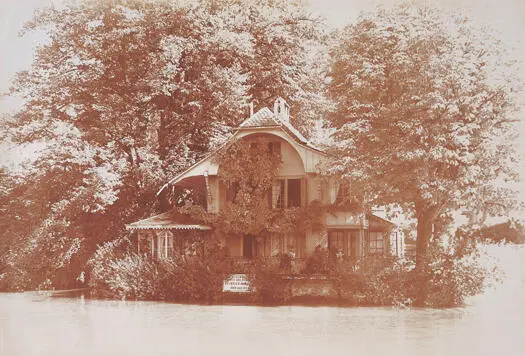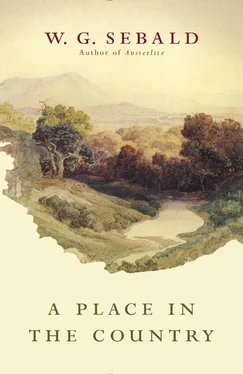The first prose work I read by Robert Walser was his piece on Kleist in Thun, in which he talks of the torment of one despairing of himself and his craft, and of the intoxicating beauty of the surrounding landscape. “Kleist sits on a churchyard wall. Everything is damp, yet also sultry. He opens his shirt, to breathe freely. Below him lies the lake, as if it had been hurled down by the great hand of a god, incandescent with shades of yellow and red.… The Alps have come to life and dip with fabulous gestures their foreheads in the water.” Time and again I have immersed myself in the few pages of this story and, taking it as a starting point, have undertaken now shorter, now longer excursions into the rest of Walser’s work. Among my early encounters with Walser I count the discovery I made, in an antiquarian bookshop in Manchester in the second half of the 1960s — inserted in a copy of Bächtold’s three-volume biography of Gottfried Keller which had almost certainly belonged to a German Jewish refugee — of an attractive sepia photograph depicting the house on the island in the Aare,

completely surrounded by shrubs and trees, in which Kleist worked on his drama of madness, Die Familie Ghonorez , before he, himself sick, was obliged to commit himself to the care of Dr. Wyttenbach in Berne. Since then I have slowly learned to grasp how everything is connected across space and time, the life of the Prussian writer Kleist with that of a Swiss author who claims to have worked as a clerk in a brewery in Thun, the echo of a pistol shot across the Wannsee with the view from a window of the Herisau asylum, Walser’s long walks with my own travels, dates of birth with dates of death, happiness with misfortune, natural history and the history of our industries, that of Heimat with that of exile. On all these paths Walser has been my constant companion. I only need to look up for a moment in my daily work to see him standing somewhere a little apart, the unmistakable figure of the solitary walker just pausing to take in the surroundings. And sometimes I imagine that I see with his eyes the bright Seeland and within this land of lakes the lake like a shimmering island, and in this lake-island another island, the Île Saint-Pierre, “shining in the bright morning haze, floating in a sea of pale trembling light.” Returning home then in the evening we look out, from the lakeside path suffused by mournful rain, at the boating enthusiasts out on the lake “in boats or skiffs with umbrellas opened above their heads,” a sight which allows us to imagine that we are “in China or Japan or some other dreamlike, poetical land.” As Mächler reminds us, Walser really did consider for a while the possibility of traveling, or even emigrating, overseas. According to his brother, he once even had a check in his pocket from Bruno Cassirer, good for several months’ travel to India. It is not difficult to imagine him hidden in a green leafy picture by Henri Rousseau, with tigers and elephants, on the veranda of a hotel by the sea while the monsoon pours down outside, or in front of a resplendent tent in the foothills of the Himalayas, which — as Walser once wrote of the Alps — resemble nothing so much as a snow-white fur boa. In fact he almost got as far as Samoa, since Walter Rathenau, whom — if we may believe The Robber on this point — he had met one day, quite by chance, in the midst of an incessant stream of people and traffic on the Potsdamer Platz in Berlin, apparently wanted to find him a not-too-taxing position in the colonial administration on the island known to the Germans as the “Pearl of the South Seas.” We do not know why Walser turned down this in many ways tempting offer. Let us simply assume that it is because among the first German South Sea discoverers and explorers there was a certain gentleman called Otto von Kotzebue, against whom Walser was just as irrevocably prejudiced as he was against the playwright of the same name, whom he called a narrow-minded philistine, claiming he had a too-long nose, bulging eyes, and no neck, and that his whole head was shrunk into and hidden by a grotesque and enormous collar. Kotzebue had, so Walser continues, written a large number of comedies that enjoyed runaway box office success at a time when Kleist was in despair, and he bequeathed a whole series of these massive, collected, printed volumes, coxed and boxed and bound in calfskin, to a posterity that would blench with shame were it ever to read them. The risk of being reminded, in the midst of a South Sea idyll, of this literary opportunist, one of the heroes of the German intellectual scene, as he dismissively calls him, was probably just too great. In any case, Walser didn’t much care for travel and — apart from Germany — never actually went anywhere to speak of. He never saw the city of Paris, which he dreams of even from the asylum at Waldau. On the other hand, the Untergasse in Biel could seem to him like a street in Jerusalem “along which the Saviour and deliverer of the world modestly rides in.” Indeed he crisscrossed the country on foot, often on epic nocturnal marches with the moon shining a white track before him. In the autumn of 1925, for example, he journeyed on foot from Berne to Geneva, following for quite a long stretch the old pilgrim route to Santiago de Compostela. He does not tell us much about this trip, other than that in Fribourg — I can see him entering that city across the incredibly high bridge over the Sarine — he purchased some socks; paid his respects to a number of hostelries; whispered sweet nothings to a waitress from the Jura; gave a boy almonds; strolling around in the dark doffed his hat to the Rousseau monument on the island in the Rhône; and, crossing the bridges by the lake, experienced a feeling of lightheartedness. Such and similar matters are set down for us in the most economical manner on a couple of pages. Of the walk itself we learn nothing, and nothing of what he may have turned over in his mind as he walked. The only occasion on which I see the traveler Robert Walser freed from the burden of himself is on the balloon journey he undertook, during his Berlin years, from Bitterfeld — the artificial lights of whose factories were just beginning to glimmer — to the Baltic coast. “Three people, the captain, a gentleman, and a young girl, climb into the basket, the anchoring cords are loosed, and the strange house flies, slowly, as if it had first to ponder something, upward.… The beautiful moonlit night seems to gather the splendid balloon into invisible arms, gently and quietly the roundish flying body ascends, and … hardly so that one might notice, subtle winds propel it northward.” Far below can be seen church spires, village schools, farmyards, a ghostly train whistling by, the wonderfully illuminated course of the Elbe in all its colors. “Remarkably white, polished-looking plains alternate with gardens and small wildernesses of bush. One peers down into regions where one’s feet would never, never have trod, because in certain regions, indeed in most, one has no purpose whatever. How big and unknown to us the earth is!” Robert Walser was, I think, born for just such a silent journey through the air. In all his prose works he always seeks to rise above the heaviness of earthly existence, wanting to float away softly and silently into a higher, freer realm. The sketch about the balloon journey over a sleeping nocturnal Germany is only one example, one which for me is associated with Nabokov’s memory of one of his favorite books from his childhood. In this picture book series, the black Golliwog and his friends — one of whom is a kind of dwarf or Lilliputian person — survive a number of adventures, end up far away from home, and are even captured by cannibals. And then there is a scene in which an airship is
Читать дальше













